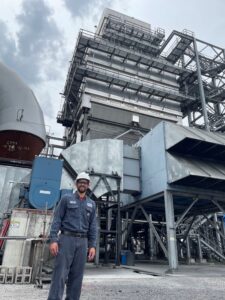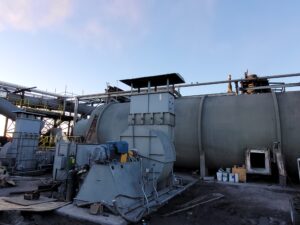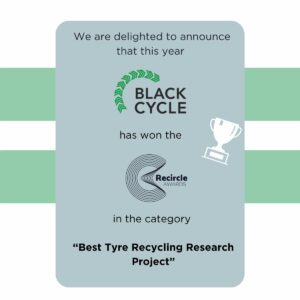By Corning Painter
We can think of air emission controls at chemical plants as filters that catch targeted materials from a stack like the way a coffee filter holds back the grounds.
The analogy does a great job describing the technology’s function with basic language. However, the comparison fails to convey the complexity and enormity of the systems that Orion S.A. has installed at our U.S. plants over the past five years – our biggest sustainability-related initiative in the company’s history. Indeed, it is simply our largest project since we became Orion.
As we come close to completing the undertaking, I thought this was a great time to share a few reflections about how significant finishing the air emissions projects will be for the environment and Orion’s continued investment in sustainability and growth.
I am sure most people who are not familiar with the carbon black business – and even many industry insiders – would be amazed at how massive and complex the controls equipment is. It is one of those things you need to see in person to fully appreciate.

I will always remember a recent visit to our plant in Ivanhoe, Louisiana, when I climbed the 150-foot structure that is part of the new system installed at the facility. From the platform, I could look out and see miles and miles of sugar cane fields and other farmland stretching far into the distance. Just below me, the hulking, gleaming components of our system – including a thermal oxidizer, waste heat recovery boiler and huge catalytic beds – took up large areas of space in the middle of our production equipment. At the edge I could see the new cogeneration equipment that a partner company is installing to generate electricity from our steam.
One of my colleagues aptly observed that the Ivanhoe project was like building a separate chemical plant inside of an operating carbon black production facility. At the Louisiana plant, Orion was the first in the carbon black industry to install technology that captured emissions and converted them to sulfuric acid, the world’s largest volume industrial chemical, ranging in use from fertilizers to traditional car batteries. It was a major milestone in Orion’s commitment to developing circular solutions for our waste streams.
I have been thinking a lot about this lately as we near the end of an extremely arduous journey that began when the U.S. Environmental Protection Agency directed all the carbon black producers in the U.S. to reduce nitrogen oxide, sulfur dioxide and particulate emissions.
Orion reached an agreement with the EPA in December 2017 about how to proceed with the project and began upgrading the emissions control systems at its four U.S. plants.
Frankly, the mandate created colossal challenges for us – both financial and technical. No other carbon black producer has as many plants in the U.S. as Orion does. With four facilities in the country, installing the systems would involve a massive price tag – about $300 million.
Adding to the burden, Orion was still a relatively new and very lean company, carved out of the German chemical company Evonik Industries just a few years before. The scale of these projects was huge for us. Ivanhoe alone was larger than either of our greenfield projects in Huaibei, China, or La Porte, Texas. We were not initially geared up for the challenge.

Building such emissions-controls systems is a huge task during normal times. And we all know the past three years have been far from normal!
Just as we were in the middle of the five-year initiative, the Covid-19 pandemic began ravaging the world, disrupting our suppliers and steady progress. Supply chain disruptions increased costs and limited the availability of building materials or delayed deliveries.
I am extremely proud that our entire team stayed committed to the goal. It is times like these when companies can show they are serious about their core values and actually live them. And that is exactly what Orion did.
We value accountability, and for us that means putting safety first and adhering to the highest standards of integrity. Innovation is another core value, and in this case, it was about finding ways to limit our emissions. Finally, building enduring relationships is our third value. For us, this includes being a positive member of our communities.
We finished our first EPA project in 2020 at our plant in Orange, Texas. The second one was commissioned in Ivanhoe in late 2021.
Most recently, our facility in Borger, Texas, was upgraded in late 2022 with a system that reduces nitrogen oxide and sulfur dioxide emissions by 90 percent, a decrease that amounts to about 23 total metric tons per day. Our final project in Belpre, Ohio, is on track to be completed in 2023.
Finishing the work will be a huge milestone for Orion. We will continue to make other major investments in sustainability-linked projects: water conservation, lithium-ion battery materials, circular economy and research focused on one of the biggest challenges in our industry – CO2 emissions. The solutions we are working hard to develop go beyond the ongoing efforts to improve yield and efficiency. They include the exploration and use of alternative feedstocks, alternative fuels, alternative production technologies, cogeneration and carbon capture and storage options.
These projects will create a virtuous cycle where our investments generate cash, which in turn fuels future investments and the transformation of our company.
All of us at Orion can look back at the past five years and feel an extreme amount of pride. We stayed committed during intensely trying times and honored our agreement to make our facilities cleaner, leading to a big impact for the environment and health in our communities.
If you think of yourself as an ESG investor, I encourage you to consider an investment in a company like Orion that is working to transform the footprint of an essential material. In fields like this, you can be a true impact investor.
Corning Painter is the CEO of Orion S.A.
 an honorable mention. This year, the Recircle award is a great recognition of the results of the project, which is co-funded by the European Union and involves 13 entities from five countries aiming to create a massive circular economy for tyres.
an honorable mention. This year, the Recircle award is a great recognition of the results of the project, which is co-funded by the European Union and involves 13 entities from five countries aiming to create a massive circular economy for tyres.





